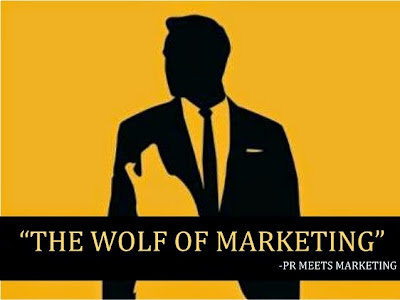"THE WOLF OF MARKETING"
Online reviews from bloggers can drive product sales in a big way. Today's most popular form of word-of-mouth marketing "BLOGGERS"
 |
| THE WOLF OF MARKETING |
Bloggers Role is Huge in Word of Mouth
Marketing
Consumers no longer want to hear
from brands anymore, they want to hear from other consumers for a
recommendation and bloggers are a key part in B2I2C. (Business to Influencer to
Consumer)
Just take a look at some of the
stats:
·
31% of
consumers say blog influenced their purchase
·
81% of
the online population trusts information and advice they get from bloggers
·
61% of
the online population has made a purchase based on a recommendation from
bloggers.
Not too long ago, when
potential customers wanted to know about the quality of your product or service,
they relied on the opinions of friends and family. Word-of-mouth is still alive
in today’s connected world—it’s just become exponentially amplified with the
use of online reviews. One good (or bad) review of your business can echo
through cyberspace indefinitely
Bigger doesn't necessarily mean better
Interestingly
enough, 54% of consumers believe that the smaller the community the bigger the
influence. Consumer’s belief in the trustworthiness of smaller
communities. No community should consider themselves too small to start
tracking metrics.
Targets are Niche Based not Genre Any-more
When PR pros reached out to traditional
journalists, they were reaching out to people who covered a much broader area
whereas bloggers write about very specific topics.
A blogger’s audience comes to them
and follows them to stay up to date, inspired or educated on a very specific
topic and a brand mention that doesn’t fit snugly within that niche sticks out
like a sore thumb.
Finding niche bloggers is a lot more
involved and time consuming than consulting a traditional media data base of
contacts. Hence the popularity of blogger outreach tools within the last few
years.
If
you’re a Group High user, the “post content filter” is very useful in finding
bloggers by targeted topics.
Because I work best with examples:
I’m promoting a brand of clothing and want to do a campaign where I have
fashion bloggers who can review my clothing brand. Well, I wouldn’t reach out
to all DIY and fashion bloggers because some never write about clothing—they
may only write about accessories.
Thus I’d want to research bloggers
who focus not just on DIY and clothing but DIY and fashion clothing that at
least occasionally include clothing style tips or inspiration in their posts. I
would also want to make sure I eliminate the bloggers who write about DIY for
people on a budget because that would not be my target audience.
Powerful Messaging
With the access everyone has to
social media and how quickly digital words can spread, everything a blogger
says—fantastic or awful—gets amplified. Through social media sharing and re
sharing and their recommendations and lack thereof in their posts.
Even a “bad pitch” now gets publicized
and spread around all over Twitter, Instagram, Pintrest and inserted in to blog
posts so a word of caution there!
More Personify
From the pitch you send to your
bloggers to the content that they create for their audience—it’s all super
targeted and personalized.
Bloggers respond better to
personalized pitches that show that you have read their blog.
They are also creating content
personalized for a targeted audience of your buyer personas so the “personal
touch” you put in your pitch and blogger communication will be reciprocated
with some fantastic posts recommending your brand.
Mid-Level Works
Many
brands are seeing success by pitching a higher volume of mid-level influencers, often in the form of bloggers, than “super influencers”
like celebrities.
It’s a Dark World
Working with traditional journalists
followed a very black and white process and set of rules.
·
Bloggers don’t set rules
·
Strict code of ethics or editorial
schedule is not required.
Involving Network Power
Because bloggers are an involving
network, their audiences tend to be very engaged and loyal.
Bloggers tailor their post and
engage audience with them because they would not be successful without their
followers. This causes a relationship of extreme loyalty which means a brand
mention causes more action than awareness.
What are your thoughts on THE WOLF OF MARKETING? Would love input in the comments
below.
Cheers to a good discussion!





